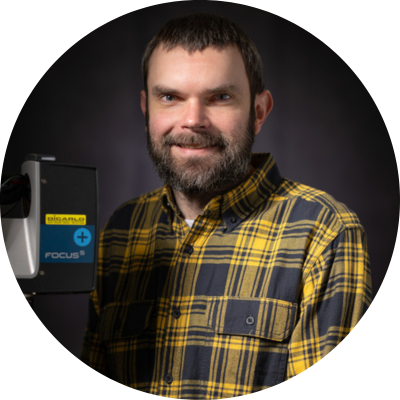Deacon Spotlight: Ryan Pierce
Ryan Pierce (BA 2008 in Art History, Minor in Religion)
3D Imaging Specialist at Architect of the Capitol in Washington, DC

Tell us about your current job role and employer. What are you currently working on?
Building on skills acquired during my career in historic preservation, I am currently working for the Architect of the Capitol (AOC) as a 3D Imaging Specialist. My work focuses on documenting the architecture, art and other subjects across the Capitol campus that are in the care of the AOC. Utilizing 3D reality capture technologies (such as laser scanning and photogrammetry), I capture and produce digital models of these subjects for an array of uses.
What key personal and/or career experiences led you to where you are today?
After graduating from Clemson’s Master’s in Historic Preservation program, the director at the time connected me with an internship with the National Park Service’s Historic American Building Survey, where I made the decision to stay on initially as a contractor with fuzzy prospects for full employment. 8+ years later after documenting an array of amazing sites across the country, I found this opportunity at the AOC and decided to take a leap into a new challenge.
What is the most challenging aspect of your job? How do you navigate that challenge?
I have had to take on a larger administrative role in helping build out and message new capabilities for my office to support the agency and our partners, and it is a very dynamic space to work in versus more traditional historic sites. I just try to stay focused on producing high quality work and remain flexible to meet the mission as it evolves.
What advice would you give to Wake Forest graduates about developing their personal life habits after college (finances, health, values, work/life balance)?
I think balance is important and that work should not be your life, but only part of it. In my opinion, your boss, if they’re reasonable, can understand you wanting to shift your hours just a bit once a week so you can go play volleyball with friends after work in the summer.
Asking for help when you’re not sure of ‘X’ thing or can’t figure it out is also a good thing to practice. Someone you know probably has had the same issue you are dealing with (financial, health, work, or otherwise). We are all just trying to make our way, and more people will be willing to talk/help than you might think.
Also, be patient. Being in a rush usually doesn’t actually get you there quicker, and we all learn to be wary of ‘get rich quick’ schemes for a reason.
We know that relationships are important for any kind of development. How do you build and maintain your network?
I just try to be friendly and take an interest in what others are doing, and this has helped me kind of organically build a network – both with colleagues in my field and new friends. Maintaining relationships can take a bit more work and effort, but reaching out occasionally helps, even for a short chat related to nothing in particular.
Tell us about your mentoring relationships. What impact have these relationships had on your career and life?
I honestly never really had much in the way of mentorship from any one person, beyond connecting to and learning from the general community around me – and I guess that community shapes everything. I do think actively engaging with others is important in relationships (though I am admittedly not always great at it) because everyone probably wants to be assured, on some level, that the folks they are interacting with made a choice to be there.
What advice would you give to current Wake Forest students and/or young alumni who are interested in working in your industry?
My specific field is pretty niche as a sub-segment of the already small field of historic preservation, but that also provides opportunity. Be willing to intern and volunteer and learn as much as you can with practical experience. Some things are best understood by doing, and I think historic documentation is one of those. But also be open to opportunities that initially might not sound exactly like what you ‘want to do.’ I certainly did not think I would be where I am now while studying art history at Wake.
What’s next for your career? What future goals or plans are you pursuing?
Currently, I continue to grow the 3D documentation capabilities of my office to support our agency’s mission, and hopefully build it as an integral portion of our process for architectural and art documentation and restoration efforts.
Story published in May 2024. For current updates about Ryan, visit his Linkedin profile.
